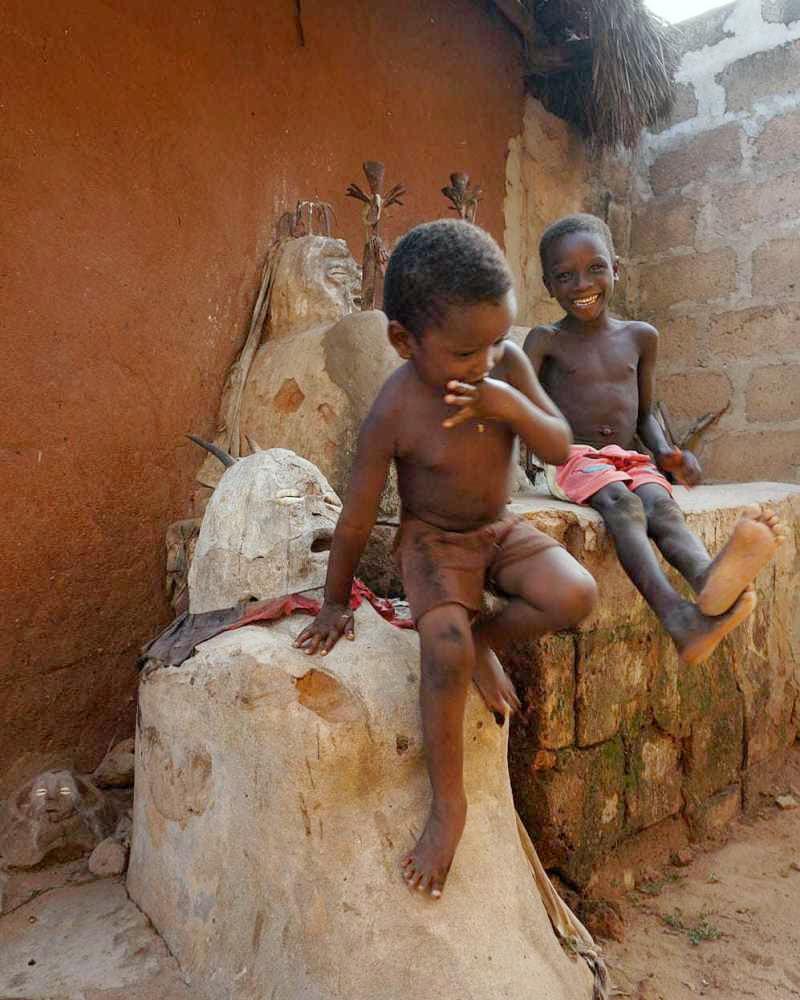
Voodoo

Figure 1.--These children in Benin are playing around a Voodoo altaer. Voodoo is a syncretic rligion, basically blending Catholocism and traditional African beliefs. It was banned by the French during the colonial period. It is now an officially recognised religion in Benin.
|
|
Voodoo/Vodou is a monotheistic religion that practiced primarily by ethnic Aftricans in the wider Caribbean.
Voodoo developed from trditional religious believes that captured African people brought with them when rhey were transported to slavery in the Americas. Slave masters attempted to prevent African cultural practices, especially religion. As a result they could not practice their native religions. The slaves thus commonly practiced Christinanity, mostly Catholocism, but many began to worship their traditional gods, but refer to them as Catholic saints. They also performed traditional rituals using Catholic reliquaries and imagery. It a syncretic or amalgamation of already existing religions. The religion appeas to have become more formalized in Haiti in part as a result of the successful slave rebellion (1791-1804). It became establishd in New Orleans, perhaps because of the French influence, the prevalence if the Catholic Church (the rest of the South was strongly Protestant), and because the slave system was not quite as strict there as the rest of the South. Voodoo merges Catholic and African beliefs to form a unique set of rituals that include Voodoo dolls and symbolic drawings. There are many Voodoo variants. It spread to other Caribbean islands and today is also practiced in Miami with the growth of the Haitain minority. The greatest number of captive Africans were transported to Brazil and enslaved there. As far as we can tell, Voodoo did not become established there, there seems to have been more of a French orientation. Slaves from Western Africa (Dahomey) appear to have played an important role in the development of Voodoo. Dahomey was an important African kingomm. That is the area of the modern country of Benin and adjacent Yoruba areas of Nigeria. Voodoo was banned by the French in the colonial era, but is a recognized religion in Benin today. The annual Voodoo Day is a popular annual celebration in Benin. Voodoo has not have had a major impact on the rest of Africa.
Notice that outside Louisana, Voodoo did not spread among the slave population of the United States. This was because the United States at the time was predominately Protestant including the vast majority of slave holders.
There is a related religion which has been adopted wihin the Hispanic community--Santería (Regla de Ocha/Lucumí). The originins are similar--the Yoruba people of West Africa (Nigeria and Benin). It seems to have develoed primarily among the slaves in Cuba, but has spread and we notice practioners among the Hispanic community in Latin America, including Mexico. Santería has not developed in Africa.
HBC

Navigate the Boys' Historical Clothing Web Site:
[Introduction]
[Activities]
[Biographies]
[Chronology]
[Cloth and textiles]
[Clothing styles]
[Countries]
[Topics]
[Bibliographies]
[Contributions]
[FAQs]
[Glossaries]
[Images]
[Links]
[Registration]
[Tools]
[Boys' Clothing Home]
Navigate the Boys' Historical Clothing national pages:
[Return to the Main Benin page]
[Return to the Main African monotheist religion page]
[Return to the Main African page]
[Angola]
[Burkina Faso]
[Cape Verde Islands]
[Democratic Republic of the Congo]
[Gabon]
[Ghana]
[Lessotho]
[Madagascar]
[Mali]
[Niger]
[Nigeria]
]South Africa]
[Togo]
[Uganda]
[France]
Created: 5:19 AM 9/20/2018
Last updated: 5:19 AM 9/20/2018



